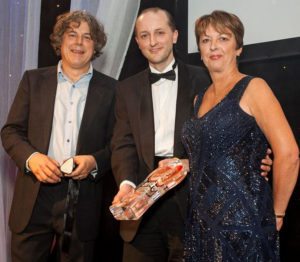 International labels company UPM Raflatac has been in the news for its work developing recycling-friendly labels for beverage containers. Continue Reading
International labels company UPM Raflatac has been in the news for its work developing recycling-friendly labels for beverage containers. Continue Reading

 International labels company UPM Raflatac has been in the news for its work developing recycling-friendly labels for beverage containers. Continue Reading
International labels company UPM Raflatac has been in the news for its work developing recycling-friendly labels for beverage containers. Continue Reading
The U.S. Food and Drug Administration cleared the way for a U.S. company to recycle PP and HDPE buckets and lids into food packaging. It also signed off on a Japanese company’s plan to recycle expanded polystyrene (EPS) trays into new PS food trays.
Those were two of the “go-aheads” included in letters of no objection (LNOs) issued by the FDA during the first half of 2016.
In all cases, the FDA determined the recycling processes would result in contaminant concentrations of 0.5 parts per billion or less in the food, below its “threshold of regulatory concern.”
In this twice-yearly roundup, Plastics Recycling Update: Technology Edition takes a closer look at the four recent LNOs (a previous roundup of LNOs is available online).
The FDA issued two LNOs to Germany’s Fraunhofer Institute for Process Engineering and Packaging (Fraunhofer IVV), which applied on behalf of two different companies: Polymetrix AG of Switzerland and FP Corp. of Japan.
Both were in regard to a secondary recycling process called Super Clean, although they involved different resins.
The March 8 LNO for Polymetrix confirmed the Super Clean process will produce recycled PET suitable for use in food packaging at up to 33 percent recycled content. The LNO is for feedstock that includes post-consumer PET containers (excluding industrial/chemical containers).
The April 1 LNO for FP Corp. confirmed the process would produce recycled PS suitable for use in trays and non-expanded sheets at up to 100 percent recycled content. The packaging would be limited to room temperatures and below.
The LNO determination was for feedstock consisting of expanded PS trays previously used for holding fruits, vegetables, marine products, meat, deli foods, processed foods, confections and bread. It excluded the use of colored PS.
During the second half of 2015, the FDA issued four similar letters for the Super Clean process to companies in Austria, Germany and Japan.
On March 9, the FDA issued an LNO to Keller and Heckman LLP, which applied on behalf of Plastic Cycle/Green Mind (PC/GM). The application covered PC/GM’s process for recycling PET for use in single-layer food trays, containers and clamshells to hold raw fruits, vegetables and eggs with their shells still on.
The process was described as a typical secondary recycling process that includes sorting, metal separation, hot-caustic wash and surface drying.
The feedstock would include PET beverage bottles, but it would exclude bottles for juices, sport drinks and other multi-layer bottles that might contain oxygen- and UV-barrier layers.
The LNO noted the containers would hold the foods for short periods of time at room temperature or below.
The FDA issued an LNO on May 10 to Keller and Heckman, which applied on behalf of Arkansas-based Ecotech Consumer Products. It covers Ecotech’s process for recycling PP and HDPE for food packaging at up to 100 percent recycled content.
The feedstock was described as PP and HDPE buckets and lids used to supply bulk icing to retail bakeries. The recycling process was described a typical secondary recycling process that doesn’t use any additives.
The new packaging is suitable for use in cold, room or hot temperatures, according to the FDA.
An FDA database contains information on all past LNOs.

Scott Knowles, co-founder of ObjectForm, receives a Plastics Industry Award from Anne Hitch of RECOUP in London. At left is awards event host Alan Davies.
A U.K. company that developed a 100 percent recycled ABS 3-D printing filament is now working to develop six other filaments made from various resins. Continue Reading
 After years of testing, car giant GM has begun recycling water bottles into a variety of products.
After years of testing, car giant GM has begun recycling water bottles into a variety of products.
 The Ellen MacArthur Foundation has organized a major plastics circular economy effort, and Dr Pepper Snapple shareholders continue to resist recycled-content goals.
The Ellen MacArthur Foundation has organized a major plastics circular economy effort, and Dr Pepper Snapple shareholders continue to resist recycled-content goals.
 Europe’s PET trade group reports on efforts to boost thermoform recycling, and Tomra wins an award in China for its advanced flake sortation technology.
Europe’s PET trade group reports on efforts to boost thermoform recycling, and Tomra wins an award in China for its advanced flake sortation technology.
 China’s Green Fence import crackdown made it more difficult – and less profitable – for FCM Recycling to ship e-scrap plastics to Asia. So the Canadian electronics recycling company went into the plastics recycling business.
China’s Green Fence import crackdown made it more difficult – and less profitable – for FCM Recycling to ship e-scrap plastics to Asia. So the Canadian electronics recycling company went into the plastics recycling business.
 A European Union panel has approved the use of Starlinger de-contamination technology to recycle post-consumer PET into 100 percent-recycled-content food and beverage packaging.
A European Union panel has approved the use of Starlinger de-contamination technology to recycle post-consumer PET into 100 percent-recycled-content food and beverage packaging.
 A European scientific panel has given its approval to a pair of industry proposals related to recycling PET into food packaging.
A European scientific panel has given its approval to a pair of industry proposals related to recycling PET into food packaging.
Continue Reading

A production line at GreenMantra Technology’s wax plant in Brantford, Ontario.
Through its use of a catalyst in a patented process, a Canadian company is recycling PE and PP into a variety of industrial waxes.
